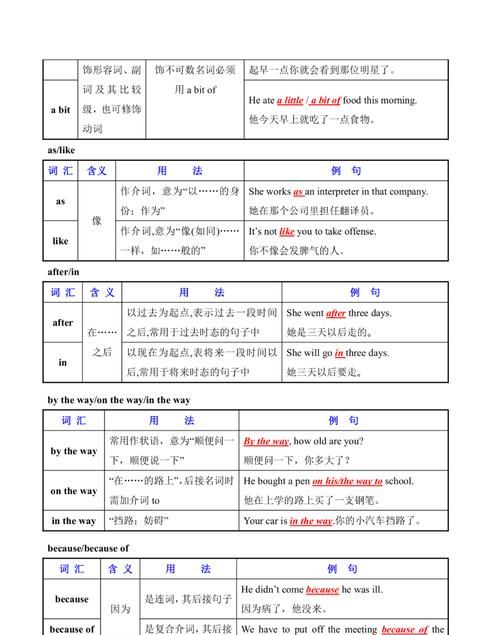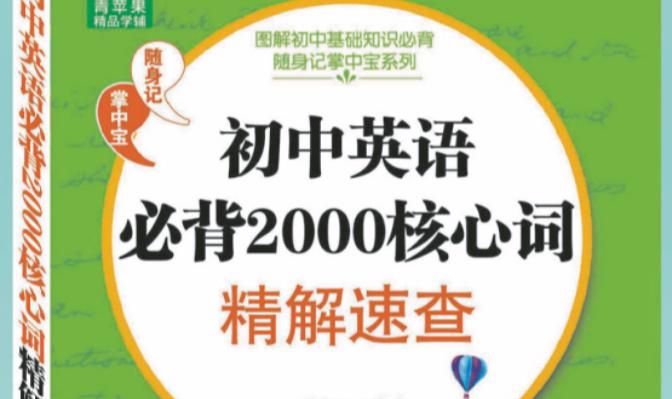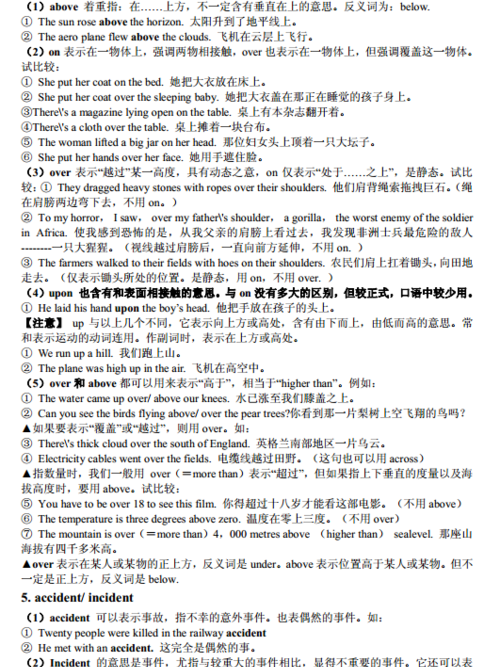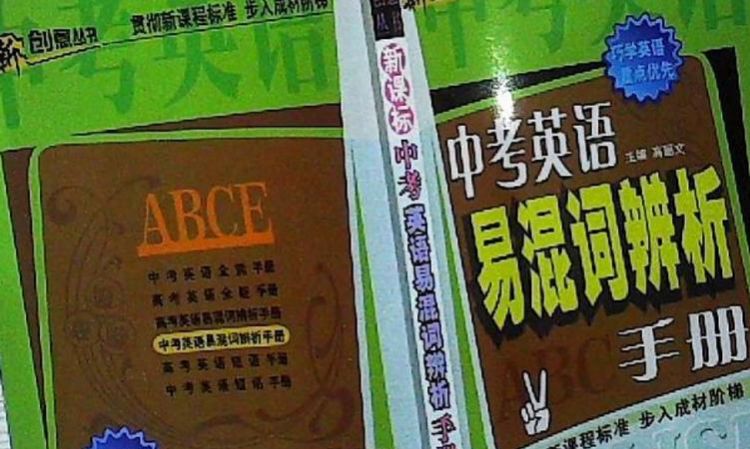本文目录
【中考语法 】2020中考英语名词考点一遍过「超全考点梳理+易错点」
【名词( Noun)表示人、事物、地点或抽象概念名称的词叫做名词。它是中考考查的重要项目之一,考查的题型很多, 有单项选择、完成句子、完形填空、综合填空等, 其中名词的数及名词所有格是中考热点。】
【一、名词的数 】
1).可数名词的数:
可数名词有单数和复数两种形式。表示一个人或物用单数形式;表示两个或两个以上的人或物用复数形式。
(1)规则名词的复数形式:
①一般在词尾加s。
如:lake--lakes, book--books, pen--pens, map--maps, flower--flowers, ruler--rulers.
②以s, x, ch,sh结尾的名词加es。如: class--classes,box--boxes,watch--watches,dish--dishes,
③以辅音字母+y结尾的名词,将y变i再加es。但以元音字母+ y结尾的名词变复数时,直接加S。如:
family--families, baby--babies, boy--boys, toy-- toys.
④以o结尾的名词,一般在词尾直接加s。如: radio- radios photo- photos piano-pianos
【但在初中阶段常考的以o结尾的名词变复数时要加es:
巧记:“黑人英雄爱坐在火山上吃芒果土豆和西红柿”】
如:Negro(黑人),heroes(英雄),volcano (火山),mangoes (芒果),potatoes(土豆),tomatoes(西红柿).
⑤以f或fe结尾的名词,复数形式多数是变f或fe为v,再加es。初中阶段常考的有9个,如:
wife--wives(妻子), knife--knives(刀子), wolf--wolves(狼), thief--thieves(小偷), shelf--shelves(架子), self--selves(自己), life--lives(生命), half--halves(一半), leaf--leaves(叶子) 。 这9个单词可以编成一段顺口溜来记忆: 妻子 执刀 去 宰 狼 , 小偷 吓得发了慌,躲在 架 后保己命, 半 片 树叶 遮目光;
但也有直接加s的。如: roof--roofs,gulf- -gulfs。
(2)不规则名词的复数形式
①改变单数名词中的元音字母,或加后缀。如: foot-- feet,tooth--teeth,goose-- geese,mouse-- mice
child--children,woman-- women
②表示“某国人”的名词的单复数因习惯不同而各异。如:
【特别提示】
记忆口诀:中日不英法变,其他s加后面。
如:a Chinese --two Chinese,
a Japanese--two Japanese (单复数相同)
an Englishman -three Englishmen,
a Frenchman--six Frenchmen(英法国人中的a变e)
an American--two Americans,a German--two Germans (词尾直接加s)
此外,Russian, African, Asian, Australian, Arab, Canadian,Italian, European 等变复数时都是直接在词尾加s.
(3)复合名词的复数形式
①将复合名词的中心词变为复数。如:passer(s)-by过路人 daughter( s)-in-law儿媳妇 step mother(s)继母
②名词+名词构成的复合名词,将第二个名词变为复数。如:
apple tree--apple trees, shoe shop--shoe shops, letter box--letter boxes, girl student--girl students.
【注意:】①复合名词为man, woman加另外一个名词构成,变复数时要把这两个词都变成复数。如:
man teacher-- men teachers, woman doctor--women doctors
②sport和其他名词构成词组时,习惯上用复数形式sports。如:
a sports hatsports newssports shoes
(4)特别的复数形式
①单数形式代表复数含义。如: cattle牛 people人们police 警务人员
②只用复数形式。如: trousers裤子clothes衣服gloves 手套glasses眼镜stockings 长简袜thanks 感谢
③单复数同形。如: deer鹿sheep绵羊fish 鱼( 注意: fishes指鱼的种类)
【单复同形口诀:】中日好友来聚会,绵羊、鹿、鱼把家回。
2).不可数名词的数
不可数名词一般没有复数形式,它包括抽象名词和物质名词。如: health, advice, milk, water, English, money,news, weather, homework, furniture, air, information, progress, rice, traffic, luck, paper, trouble.
【注意】:当water意为“海水, 江水”,paper意为“报纸,试卷” 时可有复数形式。
如:waters海水,江水 two papers两张试卷
【特别提示】
不可数名词还可以量化,但须用表示量化单位的词来修饰。如:a piece of news/ paper/ work/ bread/ meat一则新闻/一张纸/一件工作/一片面包/一块肉
a bottle of milk/water一瓶牛奶/一瓶水 three bowls of rice三碗米饭 ten cups of tea十杯茶
【二、名词所有格 】
1.表示有生命的名词的所有格
(1)一般在名词后加’s。如: my mother's birthday, Jim's pen
(2)以s结尾的名词所有格,一般只在名词右上角加’。
如:the teachers' office, the workers' club, boys' 100-metre race
(3)如果两个人共同拥有一样东西,则只在最后一个名词后加上's;如果是各自拥有,两个名词后面都要加上's。【巧记:共同拥有最后加,分别拥有分别加】
如:Damao and Xiaomao's room (共同拥有)
Damao's and Xiaomao's bags (各自拥有)
【特别提示】若名词所有格后修饰表示“家、店铺、办公室”等地点的名词,地点名词通常可以省略。
如:at Mr. White's 在怀特先生家
at the doctor's在诊所
at the tailor's 在裁缝店
2.表示无生命的名词的所有格
(1)通常采用“of +名词"结构来表示无生命东西的名词所有关系,放在被修饰名词的后面。如:the door of the house房子的门
the gate of the school学校的大门口
the name of the film电影的名字
the cover of the book书的封面
【注意:A of B 翻译成:B的A】
(2)有些表示时间、距离、国家、城市、团体、机构等无生命东西的名词,也可以加上“'s”来构成所有格。复数名词如果以s结尾,在s的右上角加 ’ 即可。
如:today's newspaper今天的报纸
ten hours' work十个小时的工作
3.双重所有格
『双重所有格是将of所有格和“'s”所有格结合在一起表示所有关系』一般是在所修饰的名词前有一个表示数量的词或指示代词。如:his, that, a, two, some, any, several, few, no, many等,但不能用定冠词the。
双重所有格两种形式:
①名词A+of+名词B’s。如:
a friend of my sister's我姐姐的一个朋友two sons of my brother's 我哥哥的两个儿子
②名词A+of+名词性物主代词。如:
a book of mine我的一本书
a classmate of his他的一位同学
【注意】a photo of Kate's 凯特的一张照片(照片有很多张,这只是其中之一,照片上拍的不一定是凯特) ,
a photo of Kate一张凯特的照片(照片上拍的人是凯特)
【三、专有名词 】
『专有名词是表示具体的人、事物、地点或机构等专有名称的词汇。』专有名词的第一个字母要大写;专有名词前一般不用冠词,但由普通名词构成的专有名词除外。如:
Sunday星期天 New York纽约
England 英国
the West Lake西湖 the Great Wall 长城
【四、中考考点梳理 】
1. 有些集体名词它的单复数均可用其本身来表示,如audience观众,class班级,club俱乐部,committee委员会,company公司,crew船员,enemy敌人,family家庭,government政府,group组,team队(当这一类词作主语时,谓语动词的单复数形式取决于其表示的具体含义,如果作为一个整体看待时,谓语动词用单数形式;如果指的是具体成员,则谓语动词用复数形式)
Mike has a big family with nine people in all. 麦克有个9个人的大家庭。
My family like watching a TV talk show at night. 我们全家都在晚上喜欢看电话脱口秀节目。
2. 当一个名词作定语修饰另一个名词时,这个名词一般用其单数形式,变复数时,只要后面那个名词改为复数形式就可以了。但是,当man 或woman作定语修饰复数名词时,就要用其复数形式。
a paper bag一只纸袋 → two paper bags 二只纸袋,
a shoe shop一家鞋店 → four shoe shops 四家鞋店
a man doctor一名男医生 → ten men doctors 十名男医生
3. 有些常以复数形式出现的名词作定语时用复数形式。
a clothes shop服装店,a glasses store眼镜店,a goods train货运列车
4. 数词加名词构成的形容词(中间有连字符)作定语时,名词常使用单数形式。
a five-year-old boy 一个三岁的男孩,a 500-metre-long rope 一条五百米的绳子
5.【特别提示 】
a. fish表示鱼的种类时,复数形式为fishes,而fish表示鱼的条数时,复数形式仍为fish。如:
different fishes不同种类的鱼five fish五条鱼
b. works意为"工厂"时,单复数形式一样,而work意为"著作,作品"时,复数形式是works。如:
a chemical works 一座化工厂three chemical works 三座化工厂
a work by Mo Yan 一部莫言的作品three works by Mo Yan 三部莫言的作品
6.【特别提示】
某些不可数名词,有形容词修饰时,之前常加不定冠词。
a deep love 深深的爱a good education 良好的教育a good time 一段美好时光
a heavy fog 一场浓雾a long silence 长时间沉寂a rich dinner 一顿丰盛的晚餐
7.常见含不可数名词的固定搭配:
a waste of time 浪费时间
air conditioning空调系统
ask for help请求帮助
at the beginning of在...的开始
at the same time同时
be in trouble 有麻烦,处于困境
classical music 古典音乐
country music乡村音乐
do one's homework做家庭作业
folk music民谣
for certain确切,肯定
go home回家
go shopping去购物
in danger处在危险状态
in memory of...为了纪念.....
in one's free time在某人空闲时
in surprise吃惊,惊讶
in the distance在远处
in the future 今后,在未来
in time及时
junk food垃圾食品
keep money存钱
listen to music听音乐
lucky money压岁钱
make peace with .....讲和
make progress 取得进步
make use of利用
no doubt无疑地
of course当然
on business出差
on time准时,按时
pop music 流行音乐
raise money 筹钱
rock music摇滚乐
take medicine吃药
take one's advice采纳某人的建议
with one's help在某人帮助之下
8.常见名词修饰语:
只修饰不可数名词
little很少,几乎没有a little有一点儿much很多
a good/great deal of很多a bit of有一点儿a large amount of大量的
既可修饰可数名词又可修饰不可数名词
some一些a lot of很多lots of很多
plenty of充足的enough足够的most大多数的
hardly any几乎没有all全部的the rest of剩下的
9.常见的既可作可数名词又可作不可数名词的词
【五、典例分类 】
1.(2019四川自贡)---What else do we need to make cold beef? --- .
A.Two spoons salt
B. Two spoons of salts
C. Two spoons of salt
2.(2019四川达州)---Hello, Lucy, please give me some ____ on how to improve my English !
----You’d better keep _____ more English books.
A.advices ; read
B.advice; read
C.advice; reading
D.advices; reading
3.(2019四川凉山州)Hurry up! Some and are on sale in the supermarket.
A. tomato; egg
B. tomatoes; egg
C. tomatoes; eggs
D. tomato; eggs
4.(2019湖南益阳)Look at the two _________over there. They are teaching the girls to play the guitar.
A. women teachers
B. woman teachers
C. woman teacher
5.(2019湖南岳阳)We should brush our _____ every day.
A.tooth B.teeth C.hand
6.(2019山东滨州) After years of war, the people in Syria are thirsty for ____________.
A. price B. noise C. peace D. course
7.(2019江苏连云港)On April 24, Xie Wenjun raced to gold in the _______110-meter hurdles at the Asian Athletics Championships in Qatar
A. man B. men
C. men's D. mens'
8.(2019四川眉山)Upstairs are _______ bedrooms. They are tidy and nice. But are in a mess.
A. Lily’s and Lucy’s; our
B. Lily’s and Lucy’s; ours
C. Lily’s and Lucy; ours
D. Lily and Lucy’s; our
9.(2019湖南怀化)_____ room looks very clean.
A. Bob and David’s B. Bob’s and David’s C. Bob’s and David
10.(2019广西河池)June 1st is ________ Day. My sister is happy on that day every year.
A.Women’s B.Fathers’ C.Teachers’ D.Children’s
【答案】
1.C
【解答】本题考查不可数名词的数量表达式。句意:---我们还需要什么来做冷牛肉呢?---两勺盐。根据问句“我们还需要什么来做冷牛肉呢”,可知答语为“两勺盐”。答语中的salt为不可数名词,没有复数形式,表示“两勺……”时,用two spoons of…故选C。
2【答案】C
【解答】本题考查不可数名词的用法。advice是不可数名词,不能直接在后面加s.故排除了A和D选项。第二空前面有keep,我们有keep doing sth.的用法,所以选C。
3【答案】C
【解答】本题考查可数名词的复数。tomato变复数是要加es的。而egg变复数是直接加s.故选C
4【答案】A
【解答】本题考查复合名词变复数的方法。复合名词为man, woman加另外一个名词构成,变复数时要把这两个词都变成复数。此题中的“二个女老师”就是women teachers.故选 A。
5【答案】C
【解答】本题考查可数名词变复数的不规则变化。tooth和foot, goose一样,变复数时都是把oo变成ee. 所以是选项B.teeth。
6【答案】C
【解答】本题考查名词词义辨析。句意为:多年的战争后,叙利亚的人民渴望和平。A.价格,代价;B. 噪音;C.和平,宁静;D.课程; 航线; 行动方向; 一道菜; 所以根据题意可知就选 C。
7【答案】C
【解答】本题考查可数名词的所有格形式。句意是:4月24日,谢文俊在卡塔乐的亚洲田径锦标赛上获得了男子的110米栏的金牌。男子们的比赛,所以得用men’s.
8【答案】B
【解答】本题考查名词的所有格。表示各自拥有,则需要在两个名词后面都要加上“s”,因为bedrooms是复数形式,所以一定是二个都有的。第二空的意思是,但是我们的(卧室)一团糟。由于横线后面没有名词,所以得用名词性物主代词。
9【答案】A
【解答】本题考查名词的所有格。由句中room是单词形式可知,这是二人共同拥有的,则只需要在最后一个名词后面加’s就好了。所以选A。
10【答案】D
【解答】本题考查名词的词义辨析。句意是六月一日是儿童节。故选D。
【六、 易混易错点拨 】
1. —Finding information is not a big deal today.
—Well, the _____________ is how we can tell whether the information is useful or not.
A. courage B. message
C. challenge D. knowledge
2. —What can I do for you, Madam?
—I’d like two _____________.
A. glass of milks B. glasses of milk
C. glass of milk D. glasses of milks
3. There is no enough _____________ in the corner to put the table.
A. placeB. roomC. floorD. ground
4. _____________ dog likes running. They often take it to the zoo.
A. Tom and Sam
B. Tom’s and Sam
C. Tom and Sam’s
D. Tom’s and Sam’s
5. ---What do we need to buy?---_____________.
A. Two kilos of potatoes and two packets of salts
B. Two kilos of potatoes and two packet of salt
C. Two kiloes of potatos and two packets of salt
D. Two kilos of potatoes and two packets of salt
6. (2019江苏扬州)---I’m not sure what to write about The Secret Garden in the report.
---You should read some _____ about the book before writing.
A. reviews B. reasons C. results D. rewards
7. Which is the _____________ to the bus stop, please?
A. road B. way C. street D. address
8. Hurry up! There is _____________ time left.
A. little B. a little C. few D. a few
9. How many _____________ can you see in the picture?
A. tomatos B. tomatoes
C. tomato D. the tomato
10. —_____________ is the meat. Please? —Ten yuan a kilo.
A. How much B. How many
C. How old D. How long
1【答案】 C
【解析】考查不可数名词的词义辨析。句意:---如今找信息不是一个大的问题。---嗯,最大的挑战是我们怎样能辨析这个信息是否有用。courage 勇气;message信息;challenge挑战;knowledge知识。根据句意可知,“怎样辨析信息是否有用是一个挑战”,故选C。
2【答案】 B
【解析】考查不可数名词的数量表达方式。句意:---我能为你做点什么,夫人?---我想要两杯牛奶。milk是不可数名词,不可数名词的数量表示为:数词+量词+of+不可数名词。由此可知“两杯牛奶”的表达方式是two glasses of milk,所以选B。
3【答案】B
【解析】考查名词词义辨析。根据句意可知,这里表示没有地方放桌子。place表示地点,是可数名词;room作可数名词意为房间,作不可数名词意为空间;floor地板,楼层;ground地面,土地,范围,战场。故选B。此题的难点在于很多同学不记得room还有空间的意思,只记得有房间的意思,故容易做错。
4【答案】 C
【解析】考查名词所有格。句意:Tom和Sam的狗喜欢跑,他们经常带它去动物园。Tom and Sam是and连接的两个人名;B选项形式不对;Tom and Sam’s表示Tom 和Sam两个人共有的;Tom’s and Sam’s表示Tom和Sam两人各自的。根据空后面的dog和下句话中的it可知,这里他们两人共有的小狗,故选C。
5【答案】 D
【解析】考查名词的数量表达方式。句意:---我们需要买什么?---两公斤土豆和两袋盐。potato土豆,是可数名词,其复数形式是 potatoes;salt是不可数名词,没有复数形式,不需要加s。所以选D。
6【答案】 A
【解析】考查名词的词义辨析。A.复习; 回顾; (报刊的)评论; B.理由; 原因; C. 结果; (尤指足球比赛的)胜利; [体]比分; 成功实现的事;D.报酬; 报答; 赏金; 酬金; 句意:---我不确定在报告里关于《秘密花园》写些什么东西。----在写之前,你可以看看关于这本书的评论。所以答案选A。
7.【答案】 B
【解析】考查名词词义辨析,road是指较宽阔的大道,意为"乡间公路",而street意为道路两边的建筑物较高,可视为街道之意,而way则多为要到达某地所要经过的途径,还可引申为方式、方法。而address则为"地址"。此题中需要用到道路,途径的意思,所以选用B.way。
8【答案】A
【解析】考查不可数名词前的修饰词。因time作为时间讲为不可数名词,所以不可用few,a few来修饰。故可以排除C和D。另外,英文的表达法与中文不同,中文讲,快点,时间不多了,而英文要讲,快点,没时间了。因此,要用little而不用a little。
9【答案】B
【解析】考查可数名词的用法。用How many提问时,其名词要用复数形式,而tomato的复数要加es。
10【答案】A
【解析】考查不可数名词的用法。由题意可知本题是询问价格的。钱数作为整体、价格讲时,不论其值是多少都是不可数名词,要用how much提问。

初三英语词语运用题型分析
1.
同为被动式的话,意思分别是:
be used for 表用途;
be used as 作为…
be used by + sb. 被某人用来…
可以这么用,
sth. be used for… by sb.
翻译成主动式:某人用某物来干什么。
2.other指的是“别的,其他的”。泛指事物。 the other 则是有一个范围的其他,指两者中的另一个。another指的是三者或三者以上的另外两个
3.首先直译上就有区别,一个是做什么,另一个是怎么做。如果有是句中两句都可用时,how to do 后面通常加it等代词 (how to do it)但what to do后面不可加
4.be known to被...所知 例句:He is known to all over the world
be known as 作为...而闻名 与be famous for“以...而出名”意思相近
例句:the great wall is knownto the people all over the world
以及be famous as 作为...而出名 如:
He is famous as a writer. 他是一个出名的作家。
5.一个是已经离开某地,一个是已经从某地离开到某地

中考易混词汇辨析:fine, nice, good
四者都可用作形容词表示"好"之意,但前三者既可作表语又可作定语,而后者仅用作表语。主要区别在于:
(1) fine指物时表示的是质量上的"精细",形容人时表示的是"身体健康",也 可以用来指"天气晴朗"。
例如:Your parents are very fine. 你父母身体很健康。
That's a fine machine.那是一台很好的机器It's a fine day for a walk today.今天是散步的`好时候。
(2)nice主要侧重于人或物的外表,有"美好","漂亮"的意思,也可用于问候或赞扬别人。
例如:Lucy looks nice. 露西看上去很漂亮。These coats are very nice. 那些裙子很好看。
Nice to meet you. 见到你很高兴。It's very nice of you. 你真好。
(3)good形容人时指"品德好",形容物时指"质量好",是表示人或物各方面都好的普通用语。
例如:Her son is a good student. 她儿子是一个好学生。
The red car is very good. 那辆红色小汽车很好。
(4)well只可用来形容人的"身体好",但不能作定语,它也能用作副词作状语,多放在所修饰的动词之后。
例如:I'm very well, thanks. 我身体很好,谢谢。
My friends sing well. 我的朋友们歌唱得好。
拓展延续
fine well good nice 区别:
1、good 常用来指人的品行好,或事物的质地好,也常用来向别人问好。
Miss Gao is a good teacher. (人好)
Your picture is very good. (物好)
Good morng. (问好)
2、fine 身体状况好,天气状况好
— How are you? — Fine, thanks. (身体状况好)
It's a fine day today. (天气状况好)
另外,fine 也可以用来指人物的品行、事物的质地“特别出色”。
He is a fine boy. (人物的品行)
The pen is fine. (事物的质地“特别出色”)
3、nice 指人或物的外观、相貌好,“美好的”、“美妙的”、“漂亮的”。
Lucy looks nice. (人的相貌好)
The flowers are very nice. (物的外观好)
Nice to meet you.
4、well 做形容词时,指人的身体好,健康好
— How is your father? — He's very well.
well 常做副词,修饰动词用。
He speaks English well.
5、OK 最勤快,有时替 fine 站岗,有时替 well 值班,表示身体好。
— How are you? — Fine, thanks. And you? — I'm OK.
OK 表示事物的完好无损,人的安然无羔。
— Is it broken? — No, it's OK.
— Oh, sorry! Are you OK?
OK 表示赞同别人的观点,“好的”。
— Let's go home. — Ok, let's go.

初中英语词汇辨析题
1. clothes, cloth, clothing
&<60; &<60;clothes 统指各种衣服,谓语动词永远是复数,cloth 指布,为不可数名词 clothing 服装的总称,
&<60; &<60;指一件衣服用 a piece of, an article of
2. incident, accident
&<60; &<60;incident 指小事件, accident 指不幸的事故 He was killed in the accident.
3. amount, number
&<60; &<60;amount 后接不可数名词,number 后接可数名词 a number of students
4. family, house, home
&<60; &<60;home 家,包括住处和家人,house 房子,住宅,family 家庭成员。My family is a happy one.
5. sound, voice, noise
&<60; &<60;sound 自然界各种各样的声音,voice 人的嗓音,noise 噪音 I hate the loud noise outside.
6. photo, picture, drawing
&<60; &<60;photo 用照相机拍摄的照片,picture 可指相片,图片,电影片,drawing 画的画
&<60; &<60;Let's go and see a good picture.
7. vocabulary, word
&<60; &<60;vocabulary 词汇,一个人拥有的单词量,word 具体的单词 He has a large vocabulary.
8. population, people
&<60; &<60;population 人口,人数,people 具体的人 China has a large population.
9. weather, climate
&<60; &<60;weather 一天内具体的天气状况,climate 长期的气候状况 The climate here is not good for you.
10. road, street, path, way
&<60; &<60; road 具体的公路,马路,street 街道,path 小路,小径,way 道路,途径
&<60; &<60; take this road; in the street, Show me the way to the museum.
11. course, subject
&<60; &<60; course 课程(可包括多门科目),subject 科目(具体的学科)a summer course
12. custom, habit
&<60; &<60; custom 传统风俗,习俗,也可指生活习惯,后接 to do,habit 生活习惯,习惯成自然,后接 of doing.
&<60; &<60; I've got the habit of drinking a lot.
13. cause, reason
&<60; &<60; cause 指造成某一事实或现象的直接原因,后接 of sth./doing sth,reason 用来解释某种现象或
&<60; &<60; 结果的理由,后接 for sth./doing sth. the reason for being late
14. exercise, exercises, practice
&<60; &<60; exercise 运动,锻炼(不可数),exercises 练习(可数),practice(反复做的)练习。
&<60; &<60; Practice makes perfect.
15. class, lesson
&<60; &<60; 作“课”解时,两者可以替换。指课文用 lesson. 指班级或全体学生用 class. Lesson 6; Class 5
16. speech, talk, lecture
&<60; &<60; speech 指在公共场所所做的经过准备的较正式的演说,talk 日常生活中的一般的谈话,讲话,lecture
&<60; &<60; 学术性的演讲,讲课 a series of lecture on …
17. officer, official
&<60; &<60; officer 部队的军官,official 政府官员 an army officer
18. work, job
&<60; &<60; 二者均指工作。work 不可数,job 可数 a good job。
19. couple, pair
&<60; &<60; couple 主要指人或动物,pair 多指由两部分组成的东西 a pair of trousers
20. country, nation, state, land
&<60; &<60; country 侧重指版图,疆域,nation 指人民,国民,民族,state 侧重指政府,政体,land 国土,
&<60; &<60; 国家 The whole nation was sad at the news.
21. cook, cooker
&<60; &<60; cook 厨师,cooker 厨具 He is a good cook.
22. damage, damages
&<60; &<60; damage 不可数名词,损害,损失; damages 复数形式,赔偿金 $900 damages
23. police, policeman
&<60; &<60; police 警察的总称,后接复数谓语动词,policeman 指某个具体的警察 The police are questioning
&<60; &<60; everyone in the house.
24. problem, question
&<60; &<60; problem 常和困难连系,前面的动词常为 think about, solve, raise,question 常和疑问连系,
&<60; &<60; 多和ask, answer 连用。
25. man, a man
&<60; &<60; man 人类,a man 一个男人 Man will conquer nature.
26. chick, chicken
&<60; &<60; 二者均可指小鸡,chicken 还可以当鸡肉 The chicken is delicious.
27. telegram, telegraph
&<60; &<60; 当电报解时,telegram 指具体的,telegraph 指抽象的 a telegram, by telegraph
28. trip, journey, travel, voyage
&<60; &<60; travel 是最常用的,trip 指短期的旅途,journey 指稍长的旅途,voyage 指海上航行 a three-day trip
29. sport, game
&<60; &<60; sport 多指户外的游戏或娱乐活动,如打球,游泳,打猎,赛马等;game 指决定胜负的游戏,通常有一套
&<60; &<60; 规则 His favorite sport is swimming.
30. price, prize
&<60; &<60; price 价格,prize 奖,奖品,奖金 win the first prize The price is high/low.&<60;&<60;
31. a number of, the number of
&<60; &<60; a number of 许多,谓语动词用复数。the number of … 的数目,谓语动词用单数。The number of
&<60; &<60; students is increasing.
32. in front of, in the front of
&<60; &<60; in front of 范围外的前面,in the front of 范围内的前面 In the front of the room sits a boy.
33. of the day, of a day
&<60; &<60; of the day 每一天的,当时的,当代的,of a day 暂时的,不长久的 a famous scientist of the day
34. three of us, the three of us
&<60; &<60; three of us 我们(不止三个)中的三个,the three of us 我们三个(就三个人)The three of us
&<60; &<60; --- Tom, Jack and I went to the cinema.
35. by bus, on the bus
&<60; &<60; by bus 表手段,方式,不用冠词,on the bus 表范围 They went there by bus.
36. for a moment, for the moment
&<60; &<60; for a moment 片刻,一会儿,for the moment 暂时,一时 Thinking for a moment, he agreed.&<60;&<60;
37. next year, the next year
&<60; &<60; next year 明年,将来时间状语,the next year 第二年,过去将来时间状语&<60;&<60;
&<60; &<60; He said he would go abroad the next year.
38. more than a year, more than one year
&<60; &<60; more than a year 一年多,more than one year 超过一年(两年或三年等)
39. take advice, take the(one's) advice
&<60; &<60; take advice 征求意见,take the advice 接受忠告 He refused to take the advice and failed again.
40. take air, take the air
&<60; &<60; take air 传播,走漏,take the air 到户外去,散步 We take the air every day.
41. in a word, in words
&<60; &<60; in a word 总之,一句话, in words 口头上 In a word, you are right.
42. in place of, in the place of
&<60; &<60; in place of 代替,in the place of 在…地方 A new building is built in the place of the old one.
43. in secret, in the secret
&<60; &<60; in secret 秘密地,暗自地,偷偷地,一般用作状语;in the secret 知道内情,知道秘密,
&<60; &<60; 一般用作表语 My mother was in the secret from the beginning.
44. a girl, one girl
&<60; &<60; a girl 可泛指所有女孩, one girl 一个女孩 Can one girl carry such a big box?
45. take a chair, take the chair
&<60; &<60; take a chair 相当于 sit down 坐下,take the chair 开始开会
46. go to sea, by sea, by the sea
50. in charge of, in the charge of
&<60; &<60; in charge of 管理,负责照料, in the charge of 由……照料 He is in charge of the matter.
&<60; &<60; The matter is in the charge of her.
51. in class, in the class
&<60; &<60; in class 在课上,in the class 在班级里 He is the best student in the class.
52. on fire, on the fire
&<60; &<60; on fire 着火, on the fire 在火上 Put the food on the fire. The house is on fire.
53. out of question, out of the question
&<60; &<60; out of question 毫无疑问的,out of the question 不可能的&<60;&<60;
54. a second, the second
&<60; &<60; a second 又一,再一,the second 第…… He won the second prize.
55. by day, by the day
&<60; &<60; by day 白天,by the day 按天计算 The workers are paid by the day.
56. the people, a people
&<60; &<60; the people 指人,a people 指民族 The Chinese is a peace-loving people.
57. it, one
&<60; &<60; it 同一物体,one 同类不同一 I lost my pen. I have to buy a new one.
58. that, this
&<60; &<60; that 指代上文所提到的,this 导出下文所要说的 I was ill. That's why ….
59. none, nothing, no one
&<60; &<60; none 强调有多少,nothing, no one 强调有没有,nothing 指物,no one 指人
&<60; &<60; --- How many …/ How much …? --- None.
60. anyone, any one
&<60; &<60; anyone 指人,不能接 of,any one 指人物均可,可接 of any one of you
61. who, what
&<60; &<60; who 指姓名或关系,what 指职业或地位 What is your dad? He is a teacher.
62. what, which
&<60; &<60; what 的选择基础是无限制的,which 在一定范围内进行选择&<60;&<60;
&<60; &<60; Which do you prefer, bananas or apples?
63. other, another
&<60; &<60; other 后接名词复数,another 后接名词单数 other students, another student
64. not a little, not a bit
&<60; &<60; not a little 非常,not a bit 一点也不 I'm not a bit tired. 我一点儿也不累。
65. many, much, a lot of
&<60; &<60; many 和可数名词连用,much 和不可数名词连用,a lot of 可数,不可数均可,但不用于否定句
&<60; &<60; I haven't many books.
66. much more … than, many more … than
&<60; &<60; much more … than 后接形容词或不可数名词,many more … than 后接可数名词 many more
&<60; &<60; people, much more water, much more beautiful
67. no, not
&<60; &<60; no = not a/any no friend = not a/any friend no water = not any water
68. no more than, not more than
&<60; &<60; no more than 相当于 only,仅仅,只有,not more than 至多,不超过
69. majority, most
&<60; &<60; majority 只能修饰可数名词,most 可数不可数均可 the majority of people
70. by oneself, for oneself, to oneself, of oneself
&<60; &<60; by oneself 单独的,独自的,for oneself 为自己,to oneself 供自己用的,of oneself 自行的,
&<60; &<60; 自动的 The door opened of itself.
71. at all, after all
&<60; &<60; at all 根本,全然, after all 到底,毕竟 After all he is a child.
72. tall, high
&<60; &<60; tall 常指人或动物,high 常指物体 He is tall.
73. fast, quickly
&<60; &<60; fast 侧重于指人或物体具有运动速度快的特点,quickly 侧重指某事完成或发生的快
&<60; &<60; run fast, answer the question quickly
74. high, highly
&<60; &<60; high 具体的高,highly 抽象的高,高度的 think highly of
75. healthy, healthful
&<60; &<60; healthy 健康的,健壮的,healthful 有益于健康的 healthful exercise
76. sleeping, asleep, sleepy
&<60; &<60; sleeping 正在睡觉,asleep 睡着,熟睡,只能做表语,sleepy 困的,有睡意的&<60;&<60;
&<60; &<60; a sleeping baby The baby is asleep. I'm sleepy.
77. gold, golden
&<60; &<60; gold 指真金制品,golden 指金色的,但金鱼用 gold fish, a gold ring
78. most, mostly
&<60; &<60; most 用于表感受的肯定句中,相当于 very,当大部分,大多数解时是形容词或名词,
&<60; &<60; mostly 大部分,是副词 most people, the people are mostly …
79. just, very
&<60; &<60; just 表强调时是副词,作状语,very 表强调时是形容词,用作定语 the very man, just the man
80. wide, broad
&<60; &<60; wide 侧重于一边到另一边的距离,broad 侧重于幅面的宽广broad shoulders
81. real, true
&<60; &<60; real 真的,真实的,指的是事实上存在而不是想象的,true 真的,真正的,指的是事实和实际情况相符合
&<60; &<60; real gold, a true story
82. respectful, respectable
&<60; &<60; respectful 尊敬,有礼貌,respectable 可敬的,值得尊敬的 be respectful to the aged&<60;&<60;
83. outwards, outward
&<60; &<60; 二者均可用作副词,表示向外,外面,outward 还可用作形容词 an outward voyage
84. pleasant, pleased, pleasing
&<60; &<60; pleasant 常用作定语,pleased, pleasing 常用作表语,pleased 主语常为人,
&<60; &<60; pleasing 主语常为物 a pleasant trip The trip is pleasing.
85. understanding, understandable
&<60; &<60; understanding 明白事理的,能体谅的,understandable 可理解的,能够懂的&<60;&<60;
&<60; &<60; an understanding girl, an understandable mistake
86. close, closely
&<60; &<60; close 接近,靠近,closely 紧紧地,紧密地 closely connected, stand close
87. ill, sick
&<60; &<60; ill 做表语,sick 定,表均可 a sick boy
88. good, well
&<60; &<60; good 形容词,well 副词,但指身体状况是形容词 He is well again.
89. quiet, silent, still
&<60; &<60; quiet 安静的,可以发出小的声音,silent 不发出声音,但可以动,still 完全不动,完全无声响
&<60; &<60; He stand there still. 他站在那儿,一动不动,也不说话。
90. hard, hardly
&<60; &<60; hard 努力,hardly 几乎不 work hard, I can hardly believe it.
91. able, capable&<60;&<60;
&<60; &<60; able 与不定式 to do 连用,capable 与 of 连用 He is capable of doing …
92. almost, nearly
&<60; &<60; 二者均为“几乎,差不多”和否定词连用用 almost almost nobody&<60;&<60;
93. late, lately
&<60; &<60; late 迟,晚,lately 最近,近来 I haven't seen him lately.
94. living, alive, live, lively
&<60; &<60; living, alive, live 均为活着的,living 定表均可,alive 定表均可,定语后置,live 只能做
&<60; &<60; 定语,lively 意为活波的 all the living people = all the people alive
95. excited, exciting
&<60; &<60; excited 使人兴奋的,exciting 令人兴奋的 I'm excited. The news is exciting.
96. deep, deeply
&<60; &<60; deep 具体的深,deeply 抽象的深,深深地 deeply moved, dig deep
97. aloud, loud
&<60; &<60; aloud 出声地,loud 大声地 read aloud (出声地读)
98. worth, worthy
&<60; &<60; 二者均为值得,worth 后接 doing,worthy 后接 to be done126. care about, care for
&<60; &<60;&<60;&<60;care about 关心,计较,在乎,一般多用于否定句中;care for 关心,照料,喜欢,愿意&<60;&<60;
&<60; &<60;&<60;&<60;He doesn't care about his clothes. I don't care for movies.
127. catch a cold, have a cold
&<60; &<60;&<60;&<60;catch a cold 不能和表示“一段时间”的状语连用,而 have a cold 可以
&<60; &<60;&<60;&<60;She has had a cold for a week.
128. change for, change into
&<60; &<60;&<60;&<60;change for 调换成,change into 变成
&<60; &<60;&<60;&<60;Change the shirt for a bigger one. Water changes into ice.
129. continue, last
&<60; &<60;&<60;&<60;二者均为持续,continue 主动,被动均可,last 只能用主动
&<60; &<60;&<60;&<60;The war continued/lasted five years. The story is to be continued.
130. feed, raise
&<60; &<60;&<60;&<60;feed 喂养,养活,饲养 (to give food to),raise 饲养,养育 (cause to grow, bring up children)
&<60; &<60;&<60;&<60;raise the family
131. go for a doctor, go to a doctor
&<60; &<60;&<60;&<60;go for a doctor 去请医生,go to a doctor 去看病&<60;&<60;
132. notice, observe, catch sight of
&<60; &<60;&<60;&<60;notice 注意到,observe 观察,仔细地看,catch sight of 突然看到 observe the stars
133. insist on, stick to
&<60; &<60;&<60; &<60;insist on 坚持要求,后常接 doing, stick to 坚持, 后常接 sth., stick to the plan
134. look, seem, appear
&<60; &<60;&<60;&<60;look 指从外表上看,seem 指内心的判断,appear 指给人以表面的印象 appear wise,
&<60; &<60;&<60;&<60;look like his father
135. gather, collect
&<60; &<60;&<60;&<60;gather 把分散的东西集中到一起,collect 指精心地、有选择地进行收集 collect stamps
136. mean to do, mean doing
&<60; &<60;&<60;&<60;mean to do 打算,想要做某事,mean doing 意思是,意味着&<60;&<60;
&<60; &<60;&<60;&<60;By this I mean giving the students more practice.
137. die from, die of
&<60; &<60;&<60;&<60;die from 表示死于(枪)伤,虚弱,过度劳累,饮食过度等,die of 表示死于疾病,饥饿,
&<60; &<60;&<60;&<60;寒冷,年老,忧愁,失恋等精神因素 die of hunger and cold
138. pay for, pay back, pay off
&<60; &<60;&<60;&<60;pay for 为…付钱,pay back 还钱,但不一定还清,pay off 还清 pay for the book, pay off the debt
139. divide, separate
&<60; &<60;&<60;&<60;divide 把一个整体分成几部分,separate 把连在一起的个体分开
&<60; &<60;&<60;&<60;divide the apple, separate the houses
140. arrive, get, reach
&<60; &<60;&<60;&<60;arrive 不及物动词,后接 in (大地点),at(小地点),get 不及物动词后接 to,reach 及物动词&<60;&<60;
&<60; &<60;&<60;&<60;arrive in Beijing, get to Beijing, reach Beijing
141. grow, plant
&<60; &<60;&<60;&<60;grow 使某种植物在某地生长着或使其发展下去,plant 移植,移栽已经长成秧苗的植物
&<60; &<60;&<60;&<60;plant the trees, trees are growing
142. manage, try
&<60; &<60;&<60;&<60;manage to do 设法做成了某事,try to do 尽力去做某事但不一定成功
&<60; &<60;&<60;&<60;He tried to pass the exam, but he failed.
143. choose, select
&<60; &<60;&<60;&<60;choose 凭个人的判断力进行选择,select 有目的地仔细认真地选择 choose the best answer
144. build, put up, set up, found
&<60; &<60;&<60;&<60;build 一般用语,建成,put up 临时搭建,set up 建成(内部的设施基本齐全),
&<60; &<60;&<60;&<60;found 国家或组织的建成 put up a tent, set up a school
145. be familiar to, be familiar with
&<60; &<60;&<60;&<60;be familiar to 某物对某人来说是熟悉的,be familiar with 某人熟悉某物&<60;&<60;
&<60; &<60;&<60;&<60;The book is familiar to me. I'm familiar with the book.
146. agree with, agree to, agree on
&<60; &<60;&<60;&<60;agree with 同意某人,agree to 同意某事,agree on 在……上达成一致意见,主语是复数
&<60; &<60;&<60;&<60;agree with you, agree to the plan
147. throw to, throw at
&<60; &<60;&<60;&<60;throw to 扔到……, throw at 朝……扔 He throw a stone at me.
148. receive, accept
&<60; &<60;&<60;&<60;receive 收到某一东西,但不一定接受,accept 接受 I received a gift, but I didn't accept it.
149. wear, put on, dress
&<60; &<60;&<60;&<60;wear 和 dress 表状态, wear 接衣服等,可用进行时,dress 接人,be dressed in, put on 表动作
&<60; &<60;&<60;&<60;It's cold outside. Put on your warm clothes.
150. listen, hear
&<60; &<60;&<60;&<60;listen 强调动作,hear 强调结果 I listened, but I heard nothing.

以上就是关于中考英语易混淆词汇辨析 ,初中英语词语辨析的全部内容,以及中考英语易混淆词汇辨析 的相关内容,希望能够帮到您。

